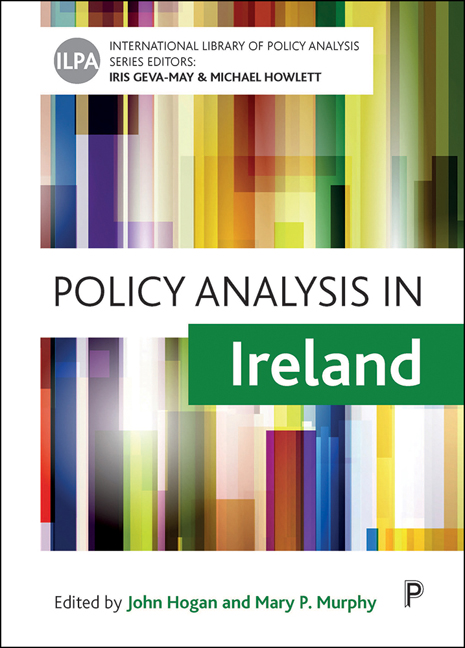Book contents
- Frontmatter
- Contents
- List of figures, tables and boxes
- List of abbreviations
- Notes on contributors
- Editors’ introduction to the series
- Acknowledgements
- Foreword
- Preface
- one Contextualising policy analysis in Ireland
- Part One: History, styles and methods of policy analysis in Ireland
- Part Two: Policy analysis at various levels of government: from local to the EU
- Part Three: Think tanks, interest groups, political parties and gender-based policy analysis
- Part Four: The public, science and the media: the wider policy analysis environment in Ireland
- Index
sixteen - Irish science policy: a case study in evidence-based policy design for small open economies
Published online by Cambridge University Press: 18 December 2021
- Frontmatter
- Contents
- List of figures, tables and boxes
- List of abbreviations
- Notes on contributors
- Editors’ introduction to the series
- Acknowledgements
- Foreword
- Preface
- one Contextualising policy analysis in Ireland
- Part One: History, styles and methods of policy analysis in Ireland
- Part Two: Policy analysis at various levels of government: from local to the EU
- Part Three: Think tanks, interest groups, political parties and gender-based policy analysis
- Part Four: The public, science and the media: the wider policy analysis environment in Ireland
- Index
Summary
Introduction
Science policy is receiving more attention as an instrument for economic development as economic growth becomes increasingly dependent on knowledge-intensive industries. The success of such industries depends on access to knowledge. As captured by modern theories of endogenous growth, new ideas (and associated new products and services) result from combining the existing stock of ideas with research and development (R&D) (Romer, 1990; Jones, 1995). Much of this R&D investment is done by private firms. However, such firms tend to underinvest in basic science and other forms of knowledge creation where much of the benefit spills over to other firms. There is therefore an important role for governments to fund and incentivise knowledge creation where that knowledge is underprovided by the market.
However, governments of small open economies (SOEs) such as Ireland face a particular challenge in devising a strategy for science policy. Smallness poses two obvious challenges: first, the benefits of science investments are likely to flow disproportionately to other countries; and second, small size may limit the benefits of agglomeration economies that are central to many knowledge-intensive industries and indeed in the production of science itself (Grossman and Helpman, 1991; Agrawal and Cockburn, 2003). In spending scarce resources on science, governments must establish a social contract with researchers and society at large to ensure the social benefits match the significant social (opportunity) costs.
Two broad rationales can be identified for why it may be worthwhile for an SOE to invest in science despite the obvious spillover and scale challenges. The first is the geographical stickiness of new knowledge production: there is a vast literature documenting the localisation of knowledge spillovers and the related tendency for knowledge to diffuse slowly across space over time (Trajtenberg et al, 1992; Agrawal et al, 2006). The second is the importance of ‘absorptive capacity’ (Cohen and Levinthal, 1990): the capacity to absorb knowledge from the vast global stocks of knowledge depends in part on being active at the frontiers in producing new knowledge. The national benefit of research is then not so much in the new knowledge you create, but the advantage that research gives you in being able to access knowledge produced elsewhere, including through research-led teaching. Recognising the importance of science investments, the Irish government has started to scale up its investments in science through funders such as Science Foundation Ireland (SFI), the Health Research Board (HRB) and Enterprise Ireland (EI).
- Type
- Chapter
- Information
- Policy Analysis in Ireland , pp. 235 - 248Publisher: Bristol University PressPrint publication year: 2021

